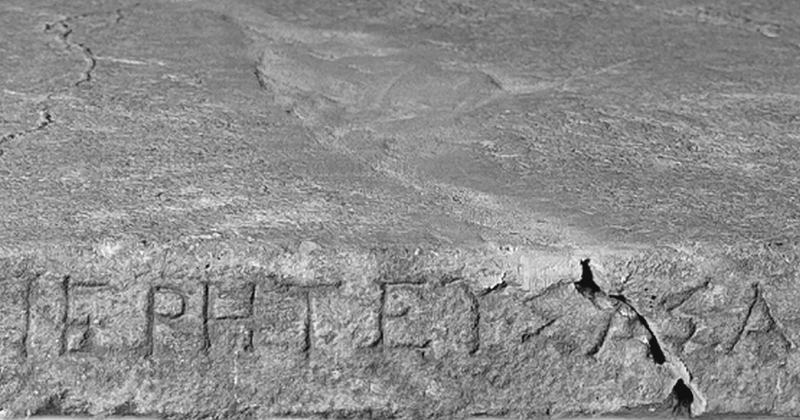One of the most interesting inscribed monuments of Dion is the marble table slab, which was found in a second use as a grave cover of the Early Christian period in the northern cemetery of the city, near the village of Karitsa. The monument probably belongs to the well-known category of sacred tables on which the offerings intended for the deity were placed (τραπεζώματα). The following inscription is engraved on its front side:
Μενεκρίτη Θεοδώρου ἱερητεύσασα Βαβοῖ
Transl. “Menecrite, daughter of Theodorus, during her priesthood (dedicated) to Baubo”.
According to the inscription, the monument was dedicated to Baubo/Babo by Menecrite, daughter of Theodorus, who was a priestess of the goddess. The name of the goddess is connected to the noun βαυβώ/βαυβών which denotes the genitalia, as well as the verb βαυβᾶν which denotes copulation. According to the version of the Eleusinian myth, which is attributed to Orpheus and was handed down by the Church writers, Baubo belonged together with the heroes Triptolemus, Eumolpus, Eubouleus and her husband Dysaules to the original inhabitants of Eleusis. When the goddess Demeter, wandering in search of her daughter Persephone, arrived there, Baubo, disturbed by her refusal to accept the food and drink offered to her, lifted her clothes and by showing her genitals made the goddess laugh.
The epigraphic evidence from other regions of the Greek world shows that the worship of Baubo is connected with that of Demeter, Kore and Zeus Eubouleus in the context of the Thesmophoria. Although the inscription from Dion constitutes the only evidence so far that Baubo had her own religious ministers, the place of her worship and therefore the place of the inscription’s provenance cannot be other than the sanctuary of Demeter. There, as it happens in other sanctuaries of the goddess, it is documented not only the worship of Kore, but also of other fertile and chthonic deities, while from other archaeological findings it is assumed that a series of sacrificial acts were carried out, which included sacrifices and ritualistic meals. Indeed, as part of the sacred ceremonies that took place during the Thesmophoria were ritualistic jokes and sexual teasing, Baubo provided the background for such events, the aim of which was to protect the human and agricultural fertility.
Bibliography
D. Pandermalis, «Λατρείες και ιερά του Δίου Πιερίας», Ancient Macedonia 2 (1973) [1977] 331-342.



